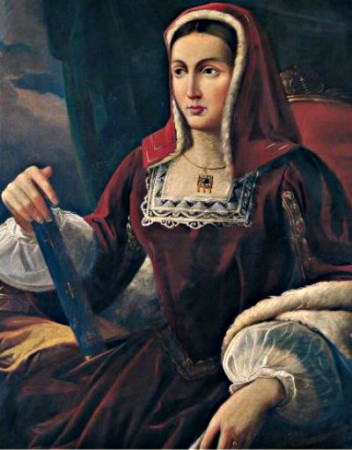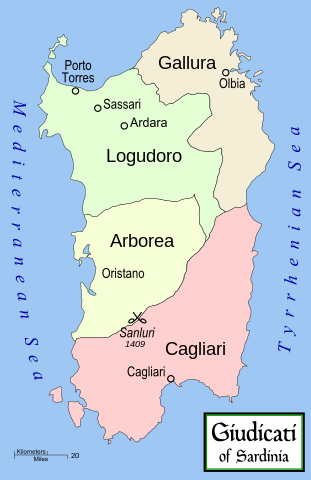Eleanor of Arborea was a determined woman. As a “Judge” in Sardinia, she enacted the Carta de Logu, charter of laws, which stood for four centuries.
Eleanor of Arborea is considered one of the most powerful and important judges of Sardinia. She is also Sardinia’s most famous heroine. As one of the last judges, serving from 1383 until her death in 1404 at age 104, she sought alliances for Arborea and secured the rights of many peasants throughout Sardinia.
After Judge Pietro III of Arborea died without descendants, Eleanor’s father became the Crown de Logu of the Judged. The Judicate of Arborea was one of four independent judicates, or independent states that took power, on the island.
Her brother, Ugone, served after their father died. Eleanor became judge in 1383 after an uprising and the assassination of Ugone and his daughter.
Although Eleanor was married to Brancaleone Doria to create and alliance between the Arborea and Doria families and provide a defense against Aragon, she was no feeble woman. She is said to have had a natural propensity for weaponry and superior political foresight.
As soon as she became judge, there was trouble with the Aragons. She sent her husband to Spain, to the court of Peter IV of Aragon, to her bidding. Peter did not want such a powerful couple in Sardinia and held Brancaleone hostage until his son, Federico was delivered to the Spanish king and until Peter could force Eleanor to obey him. Brancaleone conceded, but Eleanor did not. She preferred war to turning over her son, who she was acting for as regent.
Eleanor traveled the island looking to reorganize the judicate and asked everyone, from magistrates to serfs for an oath of loyalty to Federico. Thousands of soldiers pledged their loyalty and Doria money paid for the training of an army.
Two years later, Brancaleone was still in prison, so she bribed servants and guards to help him escape. Her plan failed when one of them told of the plan. Eleanor decided a peace treaty was needed, but Peter died during negotiations. Federico also died this year and his brother, Mariano V, succeeded him under the regency of Eleanor.
A peace treaty was signed, but Brancaleone spent another year in jail. War broke out again and she and her husband were sentenced to death. Eleanor again sought peace.
Eleanor had successfully defeated the Aragons and controlled nearly all of Sardinia.
The Carta de Logu was written between 1392 and 1395, and became law in April 1395. It was divided into 198 chapters.
Copies were distributed to every town and village so the law could be read, learned, and applied equally throughout the country. Penalties for most crimes were a fine.
Equality before the law was enacted. Anyone breaking a law would be subject to a penalty regardless of who broke the law or their socioeconomic status.
She took care to make distinctions with a crime, for instance, between killing a person deliberately (murder) and without intention (manslaughter).
She gave the right for daughters to have the same inheritance as sons.
She changed the law so if a woman were raped, she would not be forced to marry her rapist. Eleanor established two principles. The woman decided if she wanted to marry her rapist. The rapist had to pay full reparations. If he did not, there was an extremely large fine, or have a foot cut off. If the woman did not want to marry her rapist, he was still obligated to pay a dowry, suitable to her social status, to provide for her future and she was free to marry anyone she wanted. However, the rapist still had to make the decision between the fine or having his foot cut off. The woman’s status – virgin, unwed, betrothed, or married – did not matter in cases of rape.
One of Eleanor’s favorite pastimes was falconry and she used her power to protect the bird. She is credited as the first person in history to protect falcon’s nests from illegal hunting. Eleonora’s falcon is named after her because of her preservation interests. If you violated this law, punishments were as serious as those for homicide.
Another law required a summons to be delivered with a witness and it must be attempted to be delivered three times. Delivery attempts were required to be recorded.
Eleanor added that a defendant was entitled to a legal defense and could name up to ten adult witnesses to support him. Torture to gain a confession was not allowed, unless the accused already had a bad reputation.
A panel of “good men” were entrusted with judgment in a case.
One law that still stands today is the burning of grass stubble. It must be burned before Sept. 8 to prevent serious fires.
She provided the idea of wills so the deceased’s wishes could be granted, regulated deposition of witnesses, and regulations regarding taxes, trade, hunting, and other matters of legal and social life.
Orphans were entrusted to a guardian, chosen by the local authority, from the child’s closest relatives or strangers “of good reputation.” The person chosen could not say no without a really good reason. The Judicature’s registry also had the power to periodically check up on the orphan and defended the child’s best interests.
Eleanor is considered one of the first lawmakers to establish misfeasance and a condition of reciprocity when dealing with foreigners.
According to “Women in Law,” by Virginia Lalli, The Carta de Logu was in effect in Sardinia from 1395 until 1827 when the Albertine Statutes were enacted.
Eleanor died of plague in 1404, three years before Mariano V. He had no children and was succeeded by William III. Her death led to the slow decline of Arborea, which ended in 1420 with the Spanish invasion of Sardinia.
After the Aragons captured Sardinia, the only thing remaining of the Judicature of Arborea was Eleanor’s code, but the woman was not forgotten. She later became a symbol of Sardinian independence in the 19th century.
Eleanor never submitted to anyone. Her strong-willed and independent nature created a lasting legacy that was well ahead of its time.



